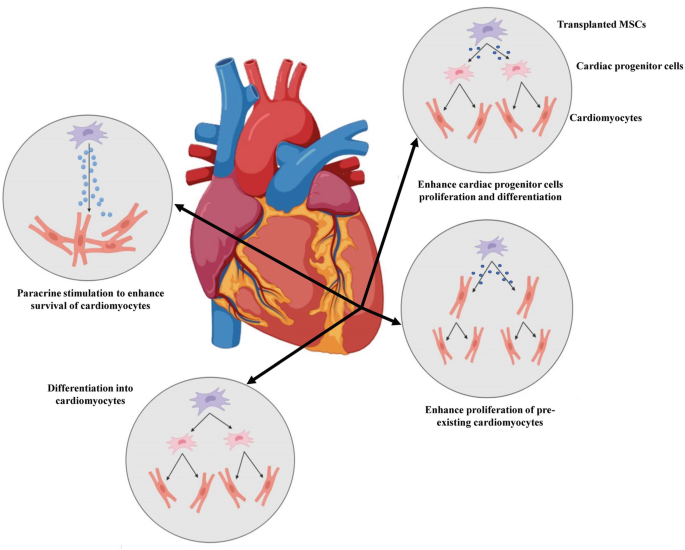Table of Contents
One is by transforming into brand-new heart cells that replace broken ones. This involves releasing different factors that boost cells repair and regeneration without really ending up being new cells.
The heartespecially after injuryisn't a welcoming place. It's hard for new cells to take hold and even harder for the body to approve them. Also if the cells make it through, they still have to attach with the heart's electric system. Without the required electrical combining, the cells can't sync with the heart's natural rhythm.
Scientists are running medical tests to find out what sort of stem cells work best, how to provide them securely, and exactly how to lower the general dangers included. They are additionally working with options like making use of bioengineered supportive scaffolds or genetics editing and enhancing to enhance efficiency. Development is being made on several fronts, and each research study gets us a little closer to making stem cell therapy a routine part of heart care.
There's additionally very early proof that this therapy might minimize the threat of heart failing after a heart attack. Stem cell therapy isn't a remedy allnot yetbut it's pointing us in the ideal direction. As research continues we may quickly see a future where the heart can do what as soon as appeared impossible: heal itself.

There are still obstacles, like cell survival and proper combination, development is encouraging. Future techniques and modern technologies like bioengineering and genetics modifying could open the full potential of stem cell treatments, supplying wish for people dealing with heart problems. With cardiac stem cells, there's an opportunity for your heart to heal itself, resulting in much better end results and a healthier future.
Does stem cell therapy support High Blood Pressure — what the science says
There is no therapy approach that directly strengthens the heart muscular tissue aside from stem cell treatment. Improvements at different levels were gauged in 87% of clients receiving stem cell therapy for heart failing and heart disease. Stem cells have the ability to deal with sick blood vessels when they touch the unwell capillary wall surface and they're also made use of to deal with cardiac arrest by turning into heart muscular tissue cells if there is weakness in the heart muscle mass.
Treatment is lugged out making use of endothelial, mesenchymal stem cells (derived from the individual's very own adipose cells or bone marrow) or fetal stem cells. Stem cells are administered intravenously to the individual.
Atherosclerosis, i.e. vessel stiffness, is the main source of complete stopping of blood circulation or reduced blood circulation. Lots of factors such as high cholesterol, hypertension, smoking lead to development of plaques in the vessel wall surface in time and loss of elasticity of the vessel. These plaques grow in time, narrowing the capillary and can protect against ample amount of blood from entering the vessel (chronic).
Anemia may additionally develop as a result of uncommon tightening of the capillary without an occlusive mechanical variable. Heart problem therapies depend upon the kind and severity of the desease. Intense conditions such as heart strikes call for immediate medical treatments to reduce heart damages. For chronic illness, doctors may suggest that clients customize their diet, slim down, workout (under supervision), technique stress and anxiety management, and give up smoking cigarettes.
There is no therapy method that directly enhances the heart muscular tissue besides stem cell therapy. Stem cells have the capacity to deal with sick blood vessels when they touch the ill vein wall. They're additionally utilized to deal with cardiac arrest by developing into heart muscle mass cells if there is weakness in the heart muscular tissues.
Deep dive into how stem cells help with High Blood Pressure
They speed up the treatment of heart muscle mass inflammation and swelling. In this way, the heart muscular tissue, the general autoimmune system and other variables are treated.

The variety of cells to be administered is determined according to the age and weight of the individual. Therapy is lugged out utilizing endothelial, mesenchymal stem cells (stemmed from the person's very own adipose tissue or bone marrow) or fetal stem cells. The choice is made according to the client's problem.
It raises within a few hours after heart is damaged and continues to be in such levels for up to 2 weeks. CK-MB - a special form of Creatine Kinase enzyme, which is primarily discovered in heart muscular tissue.
Table of Contents
Latest Posts
Regenerative injections targeting Peripheral Artery Disease with minimal downtime
Next-gen support for Peripheral Artery Disease now available
Breakthroughs in stem cell therapy for Atherosclerosis and what patients are saying
Navigation
Latest Posts
Regenerative injections targeting Peripheral Artery Disease with minimal downtime
Next-gen support for Peripheral Artery Disease now available
Breakthroughs in stem cell therapy for Atherosclerosis and what patients are saying